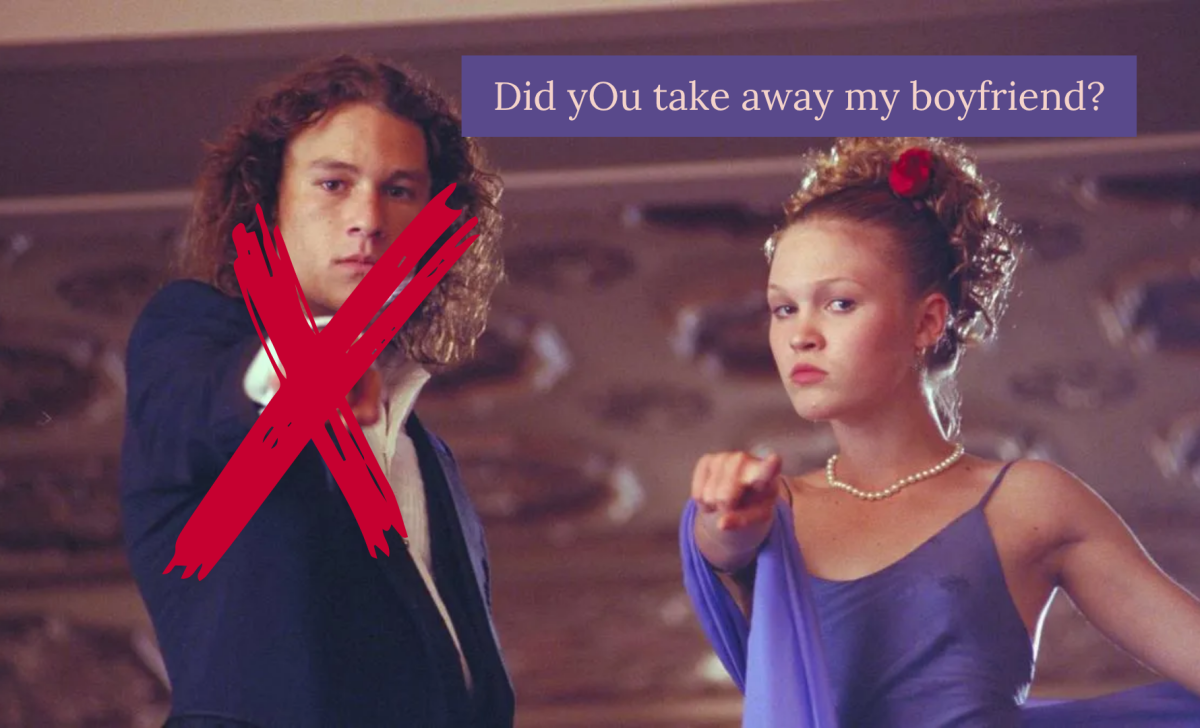I kept seeing clips of Ziwe’s George Santos interview online until I finally decided to do something I never do and watch the actual, entire 17-minute long video on YouTube. I sat and laughed and even made my sister watch, too. It was entertaining. He behaved like a perfectly-caricatured “South Park” character—spewing one-liners prepared in the mirror beforehand with a glimmer in his eye—and she had a slew of verbal assaults prepared and witty rebuts to back herself up. Then I kept watching, until I started to think “hm.” Until the on-screen banter grew into realer animosity and Santos answered one question that shifted the entire interview.
Ziwe: “Are you like Tinkerbell? If we stopped clapping would you disappear?”
Santos: “No.”
Ziwe: “What can we do to get you to go away?”
Santos: “Stop inviting me to your gigs.”
For a while, the thing that came to mind when I heard the name George Santos was one picture I’d seen of him in drag and an understanding somehow of its irony despite having done no research into his real politics. I’d seen clips of him running around the White House with a baby and sassily offering food to reporters, but to no fault besides my own, I knew nothing about him.
Santos was expelled from the House of Representatives in December for stealing money from campaign donors. He has lied about his credentials and identity, milked false connections to tragedies such as 9/11 and the Pulse nightclub shooting for his own personal benefit, claimed a degree from two universities with no record of his attendance—Baruch College and New York University—and calls himself “jew-ish.” He’s a fraud. So how come the day he was ousted, Santos hopped on Cameo* and people started paying him?
(*Note, these clips were initially going for $200 apiece and have since climbed to $500 per video)
There’s a mythologizing that happens often with political figureheads, especially within our generation. The Daily Show residue, maybe. Bernie Sanders wears mittens, AOC plays Among Us, Ted Cruz eats children. I was in fourth grade—nine years old—when my classmates started dressing up as Donald Trump for Halloween, pretending to call me and female classmates “bitches” and turning a real-life sexist pig into a caricature for their game of make-believe.
“Gen Z loves Trump,” Santos proclaimed in his Ziwe interview. “He’s an icon.”
The reality is that an individual maintains influence so long as they have a platform. Even if half of the people engaging with that platform are doing so ironically—following to make fun of, leaving hate comments—they’re still enabling people like Donald Trump and George Santos. Inflating an ego that builds its own army in and of itself.
Ziwe’s interview is well put together, presented as an object of our own entertainment. With the dramatic black-and-white backroom cutaways and calculated displays of ineptness like listing civil rights icons only to be met with shrugged shoulders, it’s easy to forget that the reality of treating problematic individuals like circus clowns still means you’re paying to watch.
Sure, Santos wasn’t paid for the interview—Ziwe actually turns that in itself into part of the bit and begins her video with emphasis that “no congressmen were paid in the making of this interview” despite Santos asking three times. But even though he didn’t technically gain anything financially, this platform only further emboldened him and turned him into a greater caricature of fiction for the public. This interview lifted his identity.
“We’re a community of Dr. Frankensteins, and he is our media monster,” notes senior editor Kevin Fallon of The Daily Beast in an article condemning the Ziwe interview in its entirety. “But here’s the thing: We don’t have to nurture him. He doesn’t have to thrive. We can ignore him, starve him of the attention he craves, and allow him to wither away. So why don’t we?”
Santos knows how to get him to disappear, but has faith that it won’t “because people want the content.” That’s exactly how he’s matched his congressional salary via Cameo—generating over $174,000 within a week—and earned himself an entire documentary put together by Jenner Hurst, creator of the “Fyre Fraud” doc. Cancel culture has no leg to stand on. It’s the same concept as any press being good press. People don’t want to think about Mr. Funny Guy’s politics because it’ll ruin their fun, even when Mr. Funny Guy is the politics.
I think there’s a lot to be gained from engaging in “problematic media,” whatever “problematic media” is deemed to be. In continuing to teach “The Great Gatsby” in high school classrooms and recognizing Fitzgerald’s blatant sexism and anti-semetism. In reading works by authors deemed problematic after their deaths—i.e. David Foster Wallace (misogynist), Sylvia Plath (racist)—with a modern, critical mind. Failure to do so ill-prepares for the world, a world that’s never been and never will be entirely cupcakes and rainbows. But there is a point when a line must be drawn between engaging critically with media, versus simply egging someone on with cameras pointed their way for the fun of it.
































